Shell Plc Bundle
How Did Shell Plc Become a Global Energy Powerhouse?
The story of Shell Plc is a compelling narrative of innovation, adaptation, and global impact, deeply intertwined with the evolution of the energy sector. From its humble beginnings, Shell has navigated the complexities of the oil industry, leaving an indelible mark on the world. Understanding the Shell Plc SWOT Analysis is crucial to grasping its strategic moves.
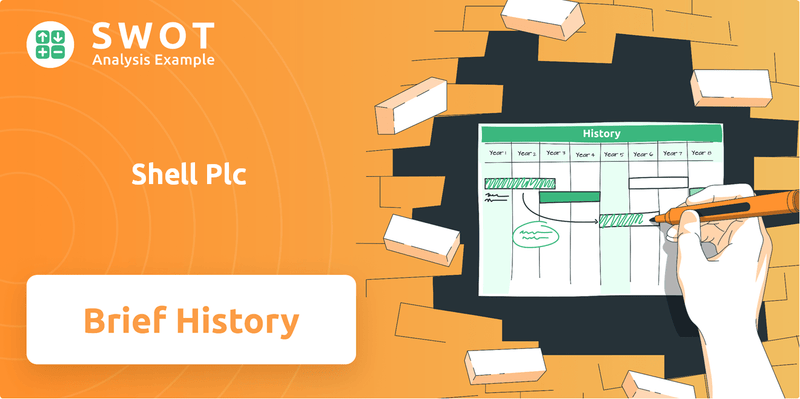
Tracing back to the early 20th century, the Shell company emerged from a merger, setting the stage for its dominance in the Shell oil market. This Shell history reveals how Royal Dutch Shell expanded its operations, becoming a cornerstone of the global economy. Exploring the Shell petroleum giant's journey offers valuable insights into the dynamics of the energy transition and strategic business practices.
What is the Shell Plc Founding Story?
The story of Shell Plc begins with a merger that shaped the global energy landscape. Formally established on April 23, 1907, it brought together two key players in the oil industry, creating a powerhouse designed to compete on a global scale. This union was a strategic move, born from the need to navigate the complexities of the burgeoning oil market and challenge existing industry giants.
The roots of Shell Plc trace back to the late 19th century, a time of rapid industrialization and increasing demand for energy. This period set the stage for the emergence of integrated energy enterprises. The merger was a strategic response to the dominance of American Standard Oil, aiming to create a more competitive global entity.
The formation of Shell Plc was a pivotal moment, marking the beginning of a new era in the oil industry. This merger created a fully integrated oil company, controlling everything from exploration and production to refining, transport, and marketing. The initial focus was on kerosene, the primary petroleum product of the time, which was essential for lighting.
The merger of Royal Dutch Petroleum Company and The 'Shell' Transport and Trading Company Ltd. on April 23, 1907, marked the official founding of Shell Plc. The company was formed to compete with Standard Oil and create a fully integrated oil company.
- Royal Dutch Petroleum Company: Founded in 1890, focused on oil exploration and production in Sumatra, Dutch East Indies.
- 'Shell' Transport and Trading Company Ltd.: Founded in 1897, revolutionized oil transport with the Murex, the first purpose-built oil tanker.
- Initial Product: Kerosene, used for lighting, was the dominant petroleum product.
- Funding: A mix of private capital and public offerings supported the early global oil operations.
The Royal Dutch Petroleum Company, established in 1890, was a key player in oil exploration and production, originating from oil discoveries in Sumatra, Dutch East Indies. The company was led by Jean Baptiste August Kessler, who recognized the potential of oil. The 'Shell' Transport and Trading Company Ltd., founded in 1897 by Marcus Samuel, addressed the challenge of safely and efficiently transporting oil. Samuel's innovation, the Murex, was the first oil tanker and transformed oil transport.
The merger was driven by the need to compete with Standard Oil. Royal Dutch contributed its oil production expertise, while 'Shell' Transport and Trading brought its global shipping and trading network. The integrated business model aimed to control all aspects of the oil business, from exploration to marketing. The company name, 'Shell', originated from Marcus Samuel's family business, which dealt in seashells. Initial funding came from private capital and public offerings, reflecting the substantial investments required to establish global oil operations. The early history of Revenue Streams & Business Model of Shell Plc shows how Shell evolved.
Shell Plc SWOT Analysis
- Complete SWOT Breakdown
- Fully Customizable
- Editable in Excel & Word
- Professional Formatting
- Investor-Ready Format
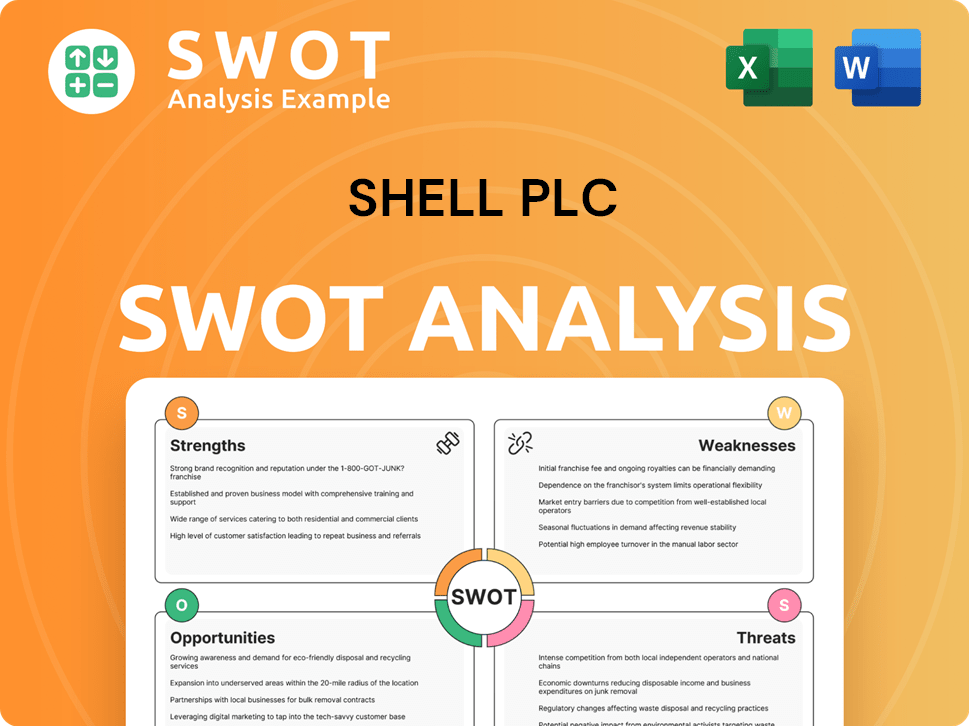
What Drove the Early Growth of Shell Plc?
Following its formation in 1907, Shell Plc experienced rapid growth and expansion. This was fueled by rising global demand for petroleum products and strategic diversification. The company quickly established a global network, securing major clients across various sectors. Initial team expansion focused on engineering, geology, and sales personnel to support its integrated operations.
Early product launches extended beyond kerosene to include petrol (gasoline) for the burgeoning automotive industry and fuel oil for industrial and marine applications. This diversification was crucial for capturing a broader market share. The focus on multiple products helped mitigate risks associated with reliance on a single commodity.
The company aggressively built a global network of marketing and distribution channels. This involved establishing offices and facilities in key strategic hubs worldwide. Refining operations in Borneo and extensive marketing networks across Europe and Asia were key to this early expansion. The company's early success was heavily reliant on efficient distribution.
Entry into new markets was aggressive, expanding its presence in countries like China, India, and various European nations. This often involved establishing local subsidiaries and partnerships. This strategy allowed Shell to adapt to local market conditions and regulations. For more insights, see the Marketing Strategy of Shell Plc.
A significant milestone was the acquisition of various smaller oil companies and the formation of joint ventures. This solidified its global footprint and access to crude oil supplies and markets. Expansion in North America, though initially challenging, saw gradual growth through acquisitions and infrastructure development. These moves were critical for securing resources.
Shell Plc PESTLE Analysis
- Covers All 6 PESTLE Categories
- No Research Needed – Save Hours of Work
- Built by Experts, Trusted by Consultants
- Instant Download, Ready to Use
- 100% Editable, Fully Customizable
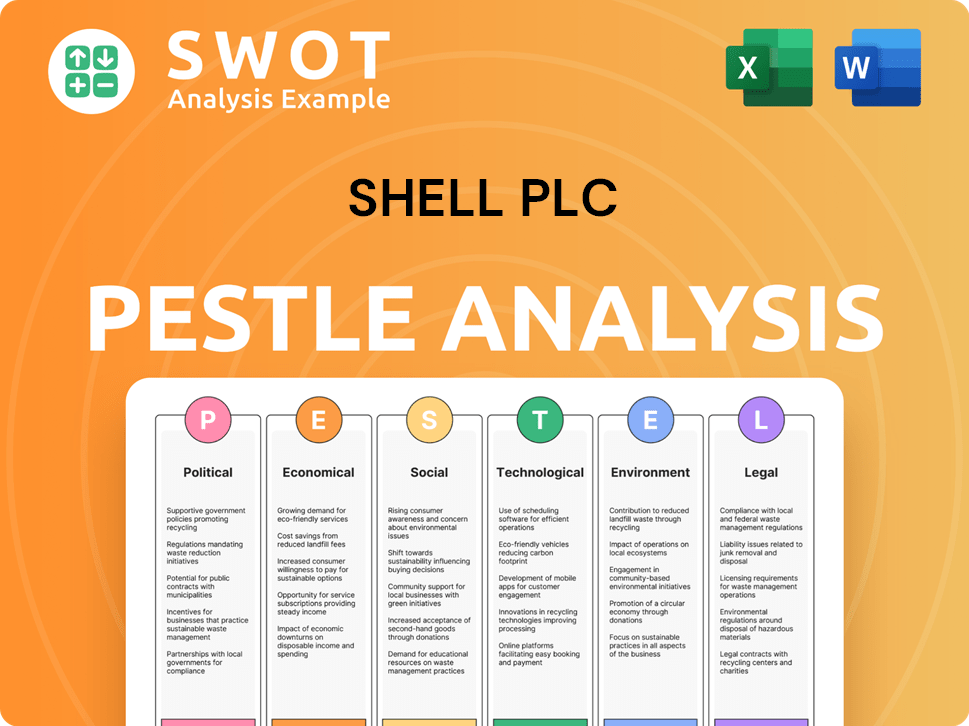
What are the key Milestones in Shell Plc history?
The Shell Plc's history is a chronicle of significant achievements, marked by strategic expansions and technological advancements that have shaped the global energy landscape. From its early ventures to its current operations, the Shell company has consistently adapted to changing market dynamics and geopolitical influences. Understanding the Shell history provides insights into the evolution of the oil and gas industry and the challenges it faces.
| Year | Milestone |
|---|---|
| 1833 | Marcus Samuel Sr. establishes a business in London trading in antiques, curios, and seashells, which would later become the foundation for the Shell oil company. |
| 1897 | The first oil tanker, the 'Murex', is built, revolutionizing oil transport. |
| 1907 | Royal Dutch Shell is formed through the merger of Royal Dutch Petroleum and the Shell Transport and Trading Company. |
| 1920s-1930s | Shell expands its operations globally, establishing a strong presence in the Americas and Asia. |
| 1950s-1970s | Shell's exploration and production activities grow significantly, with major discoveries and expansions in the Middle East and other regions. |
| 1990s-2000s | Shell focuses on streamlining operations and expanding into natural gas and petrochemicals. |
| 2016 | Shell acquires BG Group, significantly increasing its natural gas reserves and production. |
| 2021 | Shell Plc simplifies its structure and moves its headquarters to London. |
Shell Plc has consistently been at the forefront of innovation in the oil and gas sector. The company pioneered advancements in refining processes, improving the quality and efficiency of petroleum products. Shell's early adoption of oil tankers revolutionized the transportation of crude oil and refined products, enhancing global trade and supply chains.
Shell developed advanced refining techniques that improved the quality and efficiency of petroleum products. This innovation allowed for better fuel efficiency and reduced waste, contributing to the growth of the automotive industry.
The company's early adoption of oil tankers transformed the transportation of crude oil and refined products. This innovation facilitated global trade and supported the expansion of the Shell petroleum business.
Shell invested heavily in advanced exploration technologies, including seismic surveys and drilling techniques. These technologies allowed the company to discover new oil and gas reserves in challenging environments.
Shell has been a leader in Liquefied Natural Gas (LNG) technology, developing efficient methods for liquefaction, transportation, and regasification of natural gas. This has expanded access to natural gas globally.
More recently, Shell has invested in renewable energy projects, including wind and solar power, and is developing advanced biofuels and hydrogen technologies. These efforts support the company's transition to a lower-carbon future.
Shell is investing in carbon capture and storage (CCS) technologies to reduce emissions from its operations and help other industries decarbonize. This includes projects to capture CO2 and store it underground.
Shell Plc has faced significant challenges throughout its history, including market downturns and intense competition. The company has also navigated internal crises and environmental concerns, which have tested its resilience and reputation. To learn more about their values and mission, read this article about Mission, Vision & Core Values of Shell Plc.
Shell has had to manage the volatility of oil prices, which impacts its profitability and investment decisions. The company has adapted to changing market conditions by diversifying its portfolio.
The company faces strong competition from other major oil companies and national oil companies. Shell has responded by focusing on innovation and efficiency to maintain its market share.
Shell has faced scrutiny regarding its environmental impact, including emissions and oil spills. The company is investing in renewable energy and carbon capture technologies to address these concerns.
Geopolitical instability and conflicts in oil-producing regions can disrupt supply chains and affect Shell's operations. The company manages these risks through diversification and strategic partnerships.
The transition to renewable energy presents a challenge, requiring significant investment and adaptation. Shell is actively shifting its focus to include renewable energy sources, such as wind and solar power, and electric vehicle charging infrastructure.
Changes in environmental regulations and carbon pricing policies can impact Shell's operations and profitability. The company is adapting to these changes by investing in lower-carbon technologies and strategies.
Shell Plc Business Model Canvas
- Complete 9-Block Business Model Canvas
- Effortlessly Communicate Your Business Strategy
- Investor-Ready BMC Format
- 100% Editable and Customizable
- Clear and Structured Layout
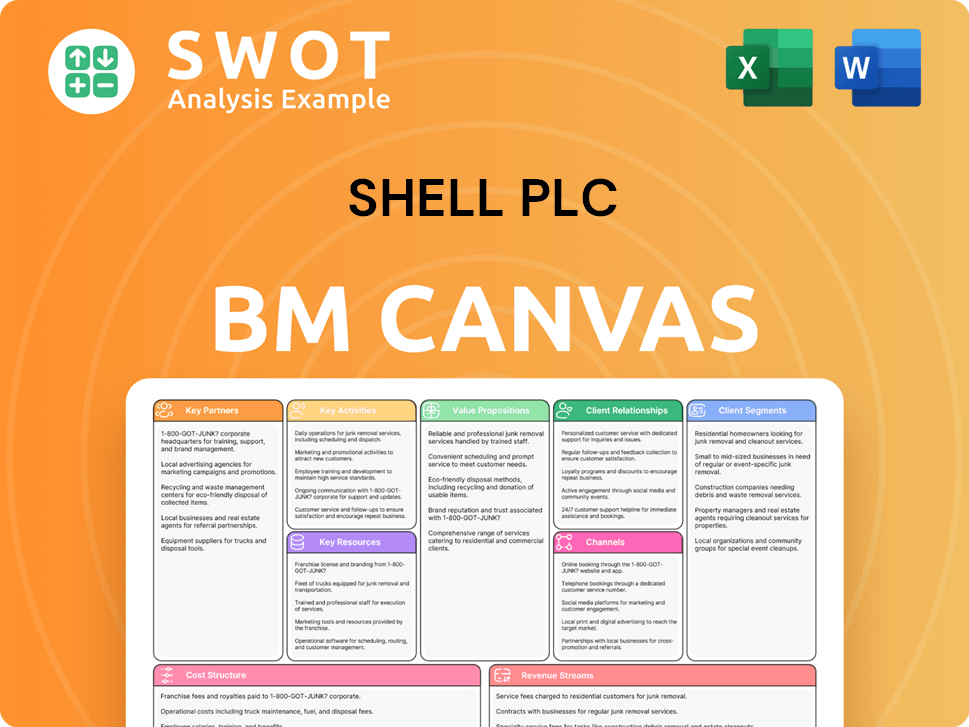
What is the Timeline of Key Events for Shell Plc?
The Shell Plc journey, from its origins to its current form, showcases a remarkable evolution within the global energy landscape. This Shell history is marked by strategic mergers, global expansions, and a growing emphasis on sustainable energy solutions.
| Year | Key Event |
|---|---|
| 1907 | Formal merger of Royal Dutch Petroleum Company and The 'Shell' Transport and Trading Company Ltd., creating Royal Dutch Shell. |
| 1910s-1920s | Significant global expansion, establishing a presence in numerous countries and diversifying its product portfolio. |
| 1929 | Co-founds the Iraq Petroleum Company, securing access to significant Middle Eastern oil reserves. |
| 1940s | Plays a crucial role in supplying Allied forces with fuel during World War II. |
| 1950s-1960s | Expansion into chemicals and natural gas, diversifying its energy offerings. |
| 1970s | Navigates the global oil crises, highlighting the volatility of the energy market. |
| 1990s | Focus on environmental responsibility begins to emerge, alongside continued global exploration. |
| 2004 | Major corporate restructuring following the oil reserves reclassification, leading to a unified corporate structure. |
| 2005 | Royal Dutch Shell Plc is formed, with a single listing on the London Stock Exchange and Euronext Amsterdam. |
| 2016 | Acquisition of BG Group, significantly expanding its liquefied natural gas (LNG) and deep-water oil production. |
| 2020 | Announces ambition to become a net-zero emissions energy business by 2050, in step with society. |
| 2022 | Relocates its headquarters to London and simplifies its share structure, dropping 'Royal Dutch' from its name to become Shell Plc. |
| 2023 | Reports significant profits amid high energy prices, while continuing to invest in its energy transition strategy. |
| 2024 | Continues to focus on strategic divestments from non-core assets and investments in low-carbon solutions. |
Shell Plc's 'Powering Progress' strategy is pivotal for its future. It aims to achieve net-zero emissions by 2050. This involves expanding its integrated power business, including renewable energy and hydrogen production. The strategy also includes investments in biofuels and carbon capture technologies.
Shell plans to increase its presence in emerging markets for low-carbon solutions. They're also expanding customer-facing businesses, like EV charging. Innovation is key, focusing on advanced biofuels, green hydrogen, and digital solutions for energy management. These efforts are designed to meet evolving consumer needs.
The energy transition, decarbonization regulations, and consumer preferences are key industry trends. Analysts predict Shell must balance its hydrocarbon business with low-carbon ventures. Maintaining profitability while meeting climate targets is crucial. This balance is vital for long-term success.
Leadership consistently emphasizes Shell's commitment to providing energy while transitioning to a lower-carbon future. This forward-looking approach aligns with the founding vision of global energy provision. The company aims to evolve sustainably for the 21st century. This evolution reflects a commitment to both present needs and future sustainability.
Shell Plc Porter's Five Forces Analysis
- Covers All 5 Competitive Forces in Detail
- Structured for Consultants, Students, and Founders
- 100% Editable in Microsoft Word & Excel
- Instant Digital Download – Use Immediately
- Compatible with Mac & PC – Fully Unlocked
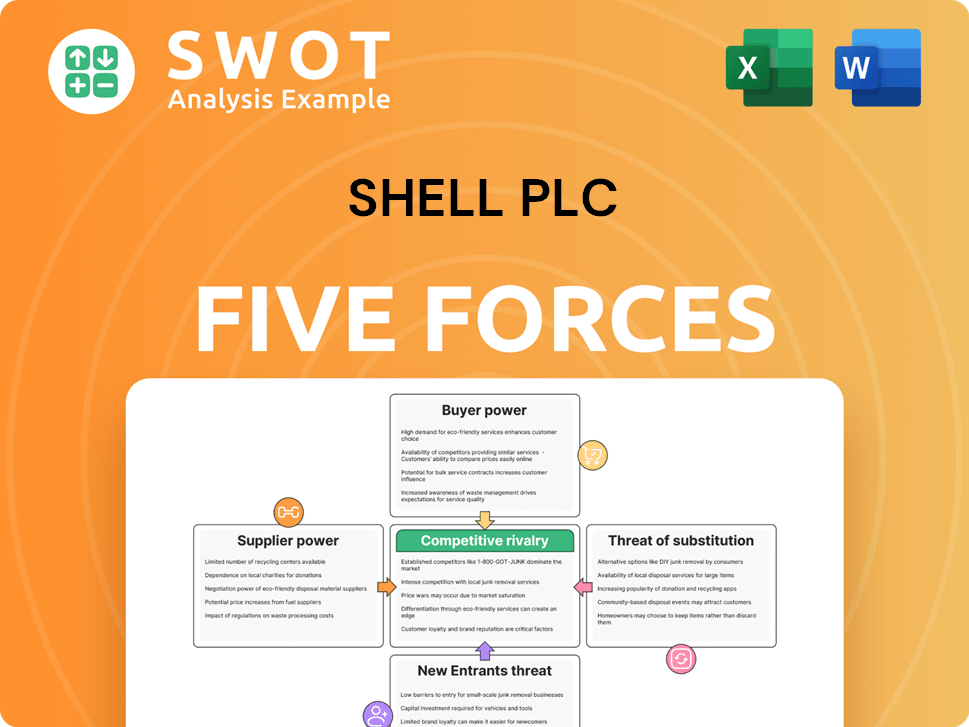
Related Blogs
- What is Competitive Landscape of Shell Plc Company?
- What is Growth Strategy and Future Prospects of Shell Plc Company?
- How Does Shell Plc Company Work?
- What is Sales and Marketing Strategy of Shell Plc Company?
- What is Brief History of Shell Plc Company?
- Who Owns Shell Plc Company?
- What is Customer Demographics and Target Market of Shell Plc Company?
Disclaimer
All information, articles, and product details provided on this website are for general informational and educational purposes only. We do not claim any ownership over, nor do we intend to infringe upon, any trademarks, copyrights, logos, brand names, or other intellectual property mentioned or depicted on this site. Such intellectual property remains the property of its respective owners, and any references here are made solely for identification or informational purposes, without implying any affiliation, endorsement, or partnership.
We make no representations or warranties, express or implied, regarding the accuracy, completeness, or suitability of any content or products presented. Nothing on this website should be construed as legal, tax, investment, financial, medical, or other professional advice. In addition, no part of this site—including articles or product references—constitutes a solicitation, recommendation, endorsement, advertisement, or offer to buy or sell any securities, franchises, or other financial instruments, particularly in jurisdictions where such activity would be unlawful.
All content is of a general nature and may not address the specific circumstances of any individual or entity. It is not a substitute for professional advice or services. Any actions you take based on the information provided here are strictly at your own risk. You accept full responsibility for any decisions or outcomes arising from your use of this website and agree to release us from any liability in connection with your use of, or reliance upon, the content or products found herein.